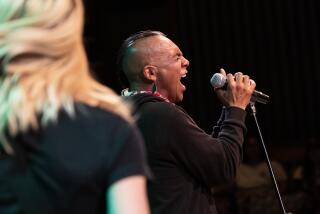Buck Page, 84; Singer Founded the Original Riders of the Purple Sage
- Share via
Buck Page, the founder of the original Riders of the Purple Sage, a western band whose music conjured up a bygone era of the open range and cowboys on horseback, has died. He was 84.
Page died of natural causes Aug. 21 in his apartment at the Burbank Senior Artists Colony, said Tim Carpenter, a friend who works at the colony.
For the record:
12:00 a.m. Sept. 8, 2006 For The Record
Los Angeles Times Friday September 08, 2006 Home Edition Main News Part A Page 2 National Desk 2 inches; 86 words Type of Material: Correction
Buck Page obituary: The obituary of western musician Buck Page in Saturday’s California section said he founded the original Riders of the Purple Sage in 1936. In fact, Jack Dalton formed a group with the same name two years earlier. The obituary also stated that the Riders of the Purple Sage group formed by Foy Willing during World War II was active until 1952. After disbanding his group in 1952, Willing reformed his Riders of the Purple Sage periodically between 1957 and his death in 1978.
Page, who sang and played 21 instruments, had his first solo CD, “Right Place to Start,” released in December. And in July, he performed before a crowd of several thousand in Scottsdale, Ariz., at a benefit celebration of the National Day of the Cowboy.
“He was the last of the great singing cowboys and an amazing guitar player,” Dave Moordigian, a musician friend, told The Times this week. “He played country, western, jazz and swing.”
When it came to the music of the Riders of the Purple Sage, Page made one thing clear.
“You’re either country or you’re western,” he said in an interview with The Times in 2000. “We sing about the Grand Canyon, cows and girlfriends back home. We don’t sing about the girl at the corner bar. We don’t cry in our beer, in other words.”
Theirs was the kind of music, he said, that cowboys played on the range at night to calm their cattle.
“You want them to stay in one place,” said Page, who owned a number of ranches over the years. “The music soothes them.”
Born in Pittsburgh on June 18, 1922, Page started playing string bass and rhythm guitar on the radio at 11 with a western band called the The Valley Ranch Boys.
Borrowing the title of a Zane Grey novel, he formed the Riders of the Purple Sage in 1936 when he was 13. Hired as a staff band at radio station KDKA, the NBC affiliate in Pittsburgh, the Riders of the Purple Sage did five hourlong shows a week that were broadcast coast-to-coast for three years.
The original members included Bob Parker on guitar, Ken Cooper on accordion, Hal McCoy on string bass and Page on guitar, banjo and fiddle.
“Most of the cowboy bands until we came along were fiddles, guitars and banjos. But it sounded kind of empty behind the vocals,” Page said in a 1994 interview with The Times. “So there was a good accordion player in town and I got him into the group. It really filled up the sound.”
Page and the Riders later moved to New York City, where they did coast-to-coast broadcasts on WOR radio, became regular performers at a nightclub called the Village Barn and toured.
During World War II, while Page was in the Navy serving aboard a submarine chaser and his fellow band members were also in the service, singer Foy Willing started a western band on the West Coast called the Riders of the Purple Sage.
Willing’s group, which was active until 1952, is the western band that had a string of hit recordings and made numerous appearances in films.
Those credits have often been incorrectly attributed to Page’s Riders of the Purple Sage by reporters in recent years, said Gary Bright, Page’s manager, whose independent record label, RPS Records, recorded and released Page’s solo CD.
Bright is not sure when Page became aware of Willing’s Riders of the Purple Sage, but he said the two men later became friends.
By the early ‘50s, Page had moved to the West Coast, where he played in various bands, worked as a studio musician (he played on shows such as “Wagon Train” and “Laramie” and played guitar on the original recording of the theme song for “Bonanza”), and played bit parts in movies.
Over the years, Page also owned and trained thoroughbreds and quarter horses and, in the 1960s, worked for the Baldwin Piano Co., where, among other things, he worked with engineers on the development of Supersound amplifiers.
Page re-formed his Riders of the Purple Sage in the early 1960s. With various members over the years, they recorded three CDs and performed at major venues and western festivals until a couple of years ago.
Page, who received the Country/Western Living Legend Award from the North America Country Music Assns., International in 2001, never lost his love of performing.
“When you get older you appreciate people and applause more,” he told The Times in 2000, when he was still performing about 150 times a year. “Standing ovations just knock me out.”
He is survived by his daughter, Christine Hanson.
More to Read
Sign up for Essential California
The most important California stories and recommendations in your inbox every morning.
You may occasionally receive promotional content from the Los Angeles Times.











